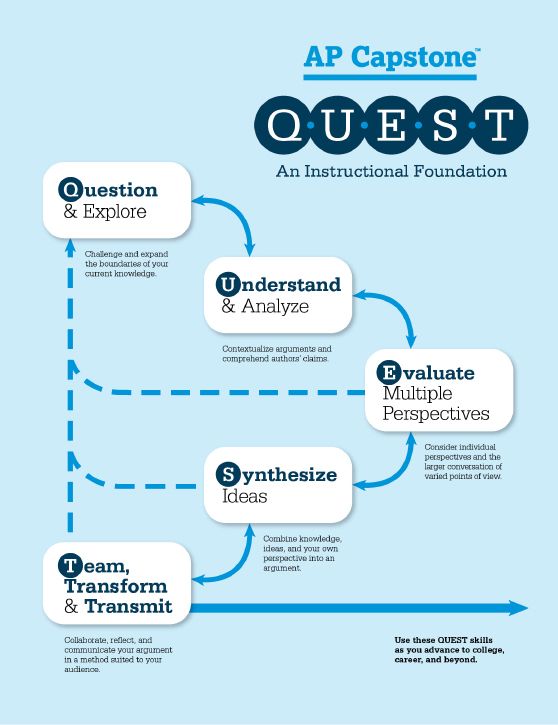AP Seminar Introduction
6 min read•june 18, 2024
Steven Kucklick
AP Seminar 💬
13 resourcesSee Units
AP Seminar Introduction
Welcome 👋 to the Fiveable guide for AP Seminar. This first introductory post will go over how this guide is formatted, what you can expect to find in this guide, and then a short overview of the key components of the class. ✍️ Feel free to navigate the guide as you need it and if you have any questions at all please reach out to a Fiveable team member.
🤔 What is AP Seminar and the Capstone Program?
The AP Capstone program is a new program started by College Board just a few years ago. It gives students the real-world 🌍 experience and practice with researching, asking big questions, writing, and presenting evidence.
The AP Capstone diploma can be achieved by successful completion of both AP Seminar and AP Research, along with passing 4 other AP exams. More information about the program can be found at the College Board website here.
AP Seminar is the first of two courses that students take in the AP Capstone program. This course is designed to give students the framework they need for AP Research (Check out that unit guide here!). 👈
The AP Capstone diploma can be achieved by successful completion of both AP Seminar and AP Research, along with passing 4 other AP exams. More information about the program can be found at the College Board website here.
AP Seminar is the first of two courses that students take in the AP Capstone program. This course is designed to give students the framework they need for AP Research (Check out that unit guide here!). 👈
AP Seminar predominately focuses on four core ideas 🧐: Question and Explore, Understand and Analyze, Evaluate Multiple Perspectives, Synthesis Ideas, and Team, Transform, and Transmit. Each of these big ideas will have their own unit guide where we will talk about their relevance to the course and how they apply to the real world.
🥳 How to take AP Seminar
Unfortunately you can not self study AP Seminar or Research, it must be taken in a class. This is because of the group work and presentations that must be completed. But don't worry! There are ways that you can advocate to get the AP Capstone program at your school. The best way to go about it is to reach out to an administrator or your principal. Explain the merits of AP Capstone and why it would be a good fit for your school. Often times if school admin sees that students want to take the class they will be more open to offering it!
👉 What can you expect from this guide?
In this guide you will be able to find three big things: an in-depth overview of the Big Ideas of AP Seminar, a look at how your AP score will be calculated, and finally how both of these things tie in together.
Before we get started, I want to highlight some key terms that will be used throughout the class. If you ever need a reminder of what a Big Idea or a Performance Task is, jump back over here!
| AP Capstone | The name of the program that AP Seminar and AP Research belong to. |
| AP Seminar | The first of the two courses in the AP Capstone program. This course is focus on developing research and presentation skills. |
| AP Research | The second of the two courses in the AP Capstone program. This course has students creating a complex research question, conducting research and presenting that research in a dissertation style paper. |
| Big Ideas | The building blocks of the AP Capstone program that highlight all of the major skills that you will be developing. Think of these like units a traditional class, but instead of learning content you learn skills. |
| Performance Tasks | These are the two in class assignments that you will be completing. These, along with the End of Course exam, will make up your 1-5 AP score. |
| End of Course Exam | The exam that you take during the normal AP exam weeks. This is comprised of two parts in which you have two hours to complete the entire exam. |
| Independent Research Report | Typically shortened to IRR, this is written during Performance Task 1. This is an overview of the research done for your particular lense. |
| Team Multi-media Presentation | Typically shortened to TMP, this is the presentation that your and your team present that argues for a solution to your research question. |
| Individual Written Argument | Typically shortened to IWA, this is the wirtten argumentative paper that you submit during Performance Task 2. |
| Individual Multi-media Presentation | Typically shortened to IMP, this is the presentation that you present in which you give an overview of your argument given in your IWA. |
💥 Big Ideas

Image from College Board
Each Big Idea (seen in the graphic above 👆) will receive its own guide. In those, we will specifically talk about what they mean and give examples of how you will see them in class. Question and Explore seems straight forward enough, but there is a lot of nuance that may not be as clear.
We will also spend a lot of time talking about the two Performance Tasks and the End of Course Exam. These three things make up your 1-5 AP score, so it's important that you're well informed about them.
The final piece of this is talking about how it all fits together. There will not be a specific guide on that, but I will be going over exactly how the Performance Tasks and exam tie in to the Big Ideas throughout the guides.
Quick Tip: It's easy to feel overwhelmed by the new terms and ideas that are thrown around in Seminar. Don't stress too much about committing these to memory right away. These will all become second nature over time!
The big takeaway of all of this is that by the end of the guides, you will feel comfortable tackling AP Seminar head on, armed with all the tools you need! 💪
✍️ How will your AP score be calculated?
Now the big question... how do you score that elusive 5 🧐 AP Seminar is a little bit different than other AP classes. Your score is based on three separate assignments: Performance Task 1, Performance Task 2, and the End of Course Exam. Your scores on each of these are averaged together to calculate your final 1-5 score. We will have a separate guide that covers each of these, but I will talk briefly about them here.
Performance Task 1 :
- This is usually referred to as the Team Presentation and is exactly that. Here, you will work with a group to research a real-world problem and attempt to come to a solution or conclusion.
Performance Task 2:
- This is more of a traditional argumentative research paper where you will research a question and argue a thesis. College Board does give you some guidance here in the form of a stimulus packet. Again, we will cover all of this in the PT 2 guide.
End of Course Exam:
- The EOC, which you will take during the AP Exam weeks, is made up of two parts that you will complete in one two-hour time period. The first part will present you with a short article and you will determine the author's thesis and evaluate their evidence and line of reasoning. The second section has you write a short argumentative essay using evidence given by College Board.
🤗 How does this all tie in together?
The Performance Tasks and the EoC are all based around the Big Ideas and the skills that you learn. This is where things get slightly different from other AP classes. You aren't really learning content as much as you are learning skills 🤯
The skills that you learn through the Big Ideas will help you be successful in the PTs and EoC. As we go through each of the Big Ideas I will make note of how this applies to the tasks that you are graded on.
Last thing before we get in to it. This guide is meant to help YOU. If for whatever reason you feel that the guide is lacking something or you are still confused, please let us know! Now, let's journey on to Big Idea 1.

Browse Study Guides By Unit
🤨Big Idea 1: Question and Explore
🧐Big Idea 2: Understand and Analyze
👥Big Idea 3: Evaluate Multiple Perspectives
💡Big Idea 4: Synthesize Ideas
🗣Big Idea 5: Team, Transform, and Transmit
✏️Frequently Asked Questions
📚Study Tools
🧐Exam Skills

Fiveable
Resources
© 2025 Fiveable Inc. All rights reserved.